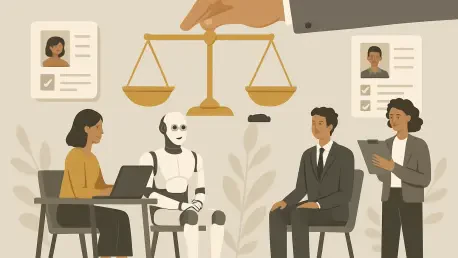As companies race to modernize their recruitment processes, a sophisticated player has emerged to both applause and skepticism: AI-driven hiring. Questions swirl around its ethical dimensions, raising concerns about bias and transparency. Yet, this technology also promises to revolutionize how organizations identify and onboard talent. How can businesses leverage this tool innovatively while ensuring fairness and compliance?
The Ethical Balancing Act
The introduction of AI into recruitment invites scrutiny. A pressing question looms: How do these systems maintain ethical integrity in a world where unconscious bias can easily infiltrate algorithms? Companies are urged to examine their processes closely to guard against inadvertent discrimination. The pivotal challenge lies in balancing automation and ethical hiring—a concern highlighted by recent regulations such as the New York City Bias Audit Law, mandating audits for AI tools in recruitment.
Transformative Impact of AI
AI’s transformative impact on hiring cannot be understated. It has the potential to streamline operations, improve candidate matching, and reduce administrative burdens. However, this revolution is not without hurdles. The integration of AI collides with real-world concerns about employment discrimination, urging companies to navigate a complex regulatory landscape. The New York City Bias Audit Law exemplifies how local governments are beginning to hold companies accountable for the tools they deploy.
Overcoming Ethical Hurdles with Innovation
The recruitment industry finds itself at a crossroads, confronting ethical challenges posed by AI. Yet, opportunities for innovation abound. The strides made by companies like Apriora, which introduced its AI interviewer Alex, showcase a pathway. Apriora’s success story is informed by third-party audits, demonstrating unbiased operations across race, gender, and ethnicity. Similarly, research by the University of Alberta confirms that AI systems can match human judgment in selecting qualified candidates, underlining the potential of technology to act fairly.
Insights from Leading Research
Industry research offers further insights into the successful deployment of AI in recruitment. A Stanford study underscores the power of collaboration between humans and AI as a strategy to minimize bias. The study advocates for AI to handle initial screenings, leaving nuanced decisions to human recruiters. Insights from AI ethics consultancy firms like BABL emphasize the need for transparent systems that allow for human oversight and intervention where necessary.
Best Practices for Ethical AI Integration
With an eye on future success, companies are encouraged to adopt strategic measures in implementing ethical AI solutions. Frameworks that guarantee transparency and compliance are vital, providing a structure that promotes trust. Leveraging AI for administrative efficiency while maintaining ethical guidelines is achievable through careful planning. Implementing clear audit trails and offering transparent feedback loops to candidates can enhance process integrity.
As the industry progresses, proving fairness and ethical integrity in AI systems has become paramount. Ethical diligence is more than a compliance requirement; it represents a profitable advantage, positioning companies at the cutting edge of innovation. The emphasis on ethical standards catalyzed competitive distinction and placed morally conscious firms at the forefront of industry change.









